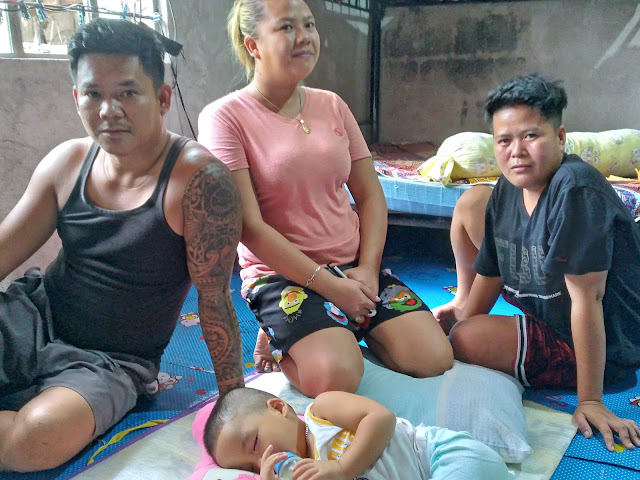#KwentongEWaste | The Woes of Informal Waste Workers: How Are They Coping With the Pandemic?
 |
| Manoy and Mara, longtime e-waste workers in Barangay San Vicente Ferrer, Camarin, Caloocan City. JOVER LARION/ECOWASTE COALITION |
Mara has been working in the streets of Caloocan as an informal waste worker since her teenage years. She used to go around and collect e-wastes and sell them to Manoy, an e-waste consolidator, in order to support herself and her family. Manoy, on the other hand, has been in the business for 15 years. From purely exchanging e-wastes to interacting about business, their relationship blossomed to a romantic one. “Hindi ko inexpect na dati binebenta ko lang sa kanya mga nakakalakal ko, at ngayon business partners na kami at masayang mag-asawa,” Mara said. Indeed, Mara and Manoy are manifestations that love can be found even in the most unexpected places.
Mara and Manoy have now been married for 6 long years, and have been blessed with two lovely children, ages 2 and 4 years old. They still work as waste dismantlers in San Vicente Ferrer, Camarin Caloocan City. Together with their other employees, they buy e-wastes, particularly old TVs, from households then dismantle them to salvage precious metals and other valuable parts and sell them to their local junk shops. For more than 15 years, waste dismantling has been their primary source of income; it helps put food on the table and a roof over their heads, especially with 2 children in tow.
The pandemic has been extremely taxing for Mara and Manoy, and also for the other waste workers. More than running in fear about the invincible virus, they also have to worry every day about paying bills on time, buying food and other necessities, and paying their employees who rely on them. “Bukod sa hirap ang pamimili ng kalakal at syempre hamon na manatiling malakas ang katawan ng aming pamilya at mga tauhan ko laban sa COVID. ‘Di mo alam kung hanggang kelan eto,“ added Manoy.
While dismantling old electronics might seem easy at face value, it is actually laced with danger – injuries from either getting slashed or hit by metal. More than this, waste dismantlers can also get significantly affected by the toxins released by burning plastic or copper wires.
“Mahirap ang pandemya sa aming pamilya, lalo na sa aming mga anak. ‘Di mo nakikita ang virus. Nag-aalala kami sa kalusugan ng aming mga anak. Dagdag isipin pa ang bayad sa renta ng bahay, bodega, kuryente, tubig, pagkain, at bayad sa mga tao.”
On top of these hazards, the pandemic has made it mostly hard for them to keep their business afloat. With strict lockdowns in place, especially during the start of March 2020, Mara and Manoy’s team were restricted from going around and buying e-wastes. From one week to another, they solely relied on their e-waste storage, but soon enough the volume dwindled down. Unfortunately, it came close to the point where they can no longer support their employees and own family. “Siyempre yung mga mangangalakal ng e-waste yun ang aming pinagkukunan ng aming kabuhayan para matugunan ang aming mga pangangailangan. Pag walang kalakal, walang din perang pambili ng pangangailangan,” Manoy added.
Almost two years into the pandemic, their business is still not back to normal. They noticed that the volume of e-wastes available have significantly decreased which adversely impacts their profit and pricing. They said that ayudas from the barangay have been helpful to a certain extent, but it still was not enough since they have other bills to pay, as well. Manoy expressed that UNIDO-DENR EMB-GEF-led Safe PCB and E-Waste Management Project helped them aplenty. Previously, their team was dismantling 100 TVs per day and quantities of tubes were simply thrown to the nearby creek. UNIDO’s project simplified the process by allowing them to direct all their e-waste to Barangay Silang’s TSD (Treatment, Storage, and Disposal) Facilities without the need to dismantle. It made the process faster, and also removed opportunities for injuries and accidents related to dismantling.
Manoy and Mara hope that all waste workers finally get the help and recognition they deserve, especially as they grapple with the pandemic. More than the ayuda, they wish that other basic social services and business support, such as UNIDO’s project, are provided to them so they can continue growing their business in a safe and timely manner. “Sana malagpasan na ang pandemic at makabalik sa dating pangangalakal para maitaguyod ang aming pamilya, yun lang naman ang gusto ko o maari naming lahat,” conveyed Manoy as he voiced out his hopes for a better future. | PATRICIA NICDAO





Comments